Critical Evaluation of Tourism in Developing Countries: A Report
VerifiedAdded on 2019/12/03
|7
|1769
|192
Report
AI Summary
This report presents a critical evaluation of the tourism sector, particularly focusing on its impact on third-world countries. It acknowledges the benefits, such as employment and economic development, while also addressing drawbacks like regional inequalities and social tensions. The report delves into the evolution of the tourism industry, including the rise of mass tourism and package tours, and examines the influence of metropolitan enterprises on tourism flows. It explores the role of tourism promotion and the development of tourism products and services in underdeveloped countries. The report further discusses the application of development theories, such as modernization and sustainable development, to improve the economies of developing nations. It then analyzes the enclave and structural models of third-world tourism, using Fiji, Cook Islands, and Tonga as case studies to highlight the varying levels of tourism development and its contribution to their respective GDPs. The report also touches upon Britton's theory of dependency and its criticisms, offering a comprehensive overview of the complex dynamics of tourism in developing countries.

Individual
critical analysis
1
critical analysis
1
Paraphrase This Document
Need a fresh take? Get an instant paraphrase of this document with our AI Paraphraser

TABLE OF CONTENTS
Critical evaluation ...........................................................................................................................3
References........................................................................................................................................6
2
Critical evaluation ...........................................................................................................................3
References........................................................................................................................................6
2
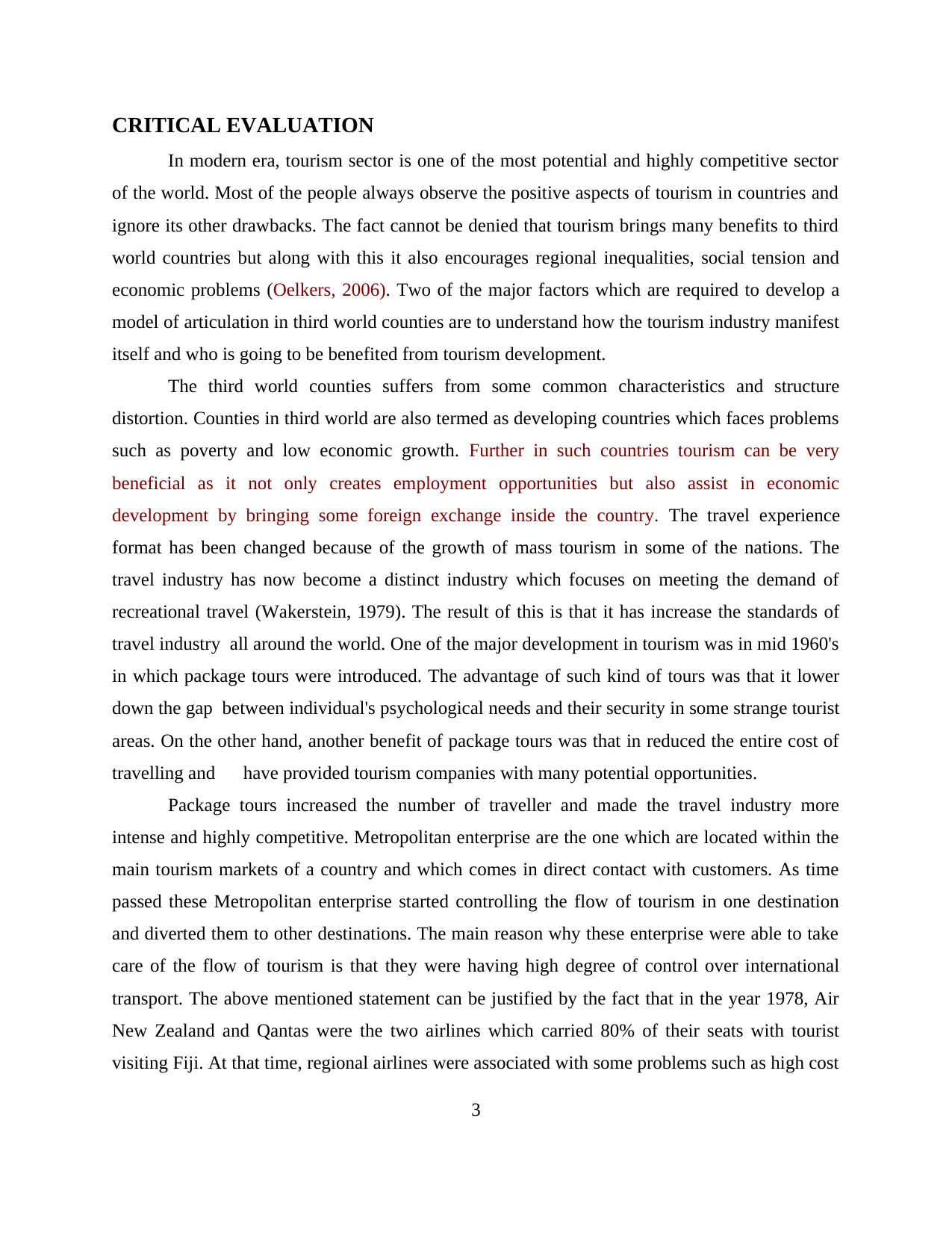
CRITICAL EVALUATION
In modern era, tourism sector is one of the most potential and highly competitive sector
of the world. Most of the people always observe the positive aspects of tourism in countries and
ignore its other drawbacks. The fact cannot be denied that tourism brings many benefits to third
world countries but along with this it also encourages regional inequalities, social tension and
economic problems (Oelkers, 2006). Two of the major factors which are required to develop a
model of articulation in third world counties are to understand how the tourism industry manifest
itself and who is going to be benefited from tourism development.
The third world counties suffers from some common characteristics and structure
distortion. Counties in third world are also termed as developing countries which faces problems
such as poverty and low economic growth. Further in such countries tourism can be very
beneficial as it not only creates employment opportunities but also assist in economic
development by bringing some foreign exchange inside the country. The travel experience
format has been changed because of the growth of mass tourism in some of the nations. The
travel industry has now become a distinct industry which focuses on meeting the demand of
recreational travel (Wakerstein, 1979). The result of this is that it has increase the standards of
travel industry all around the world. One of the major development in tourism was in mid 1960's
in which package tours were introduced. The advantage of such kind of tours was that it lower
down the gap between individual's psychological needs and their security in some strange tourist
areas. On the other hand, another benefit of package tours was that in reduced the entire cost of
travelling and have provided tourism companies with many potential opportunities.
Package tours increased the number of traveller and made the travel industry more
intense and highly competitive. Metropolitan enterprise are the one which are located within the
main tourism markets of a country and which comes in direct contact with customers. As time
passed these Metropolitan enterprise started controlling the flow of tourism in one destination
and diverted them to other destinations. The main reason why these enterprise were able to take
care of the flow of tourism is that they were having high degree of control over international
transport. The above mentioned statement can be justified by the fact that in the year 1978, Air
New Zealand and Qantas were the two airlines which carried 80% of their seats with tourist
visiting Fiji. At that time, regional airlines were associated with some problems such as high cost
3
In modern era, tourism sector is one of the most potential and highly competitive sector
of the world. Most of the people always observe the positive aspects of tourism in countries and
ignore its other drawbacks. The fact cannot be denied that tourism brings many benefits to third
world countries but along with this it also encourages regional inequalities, social tension and
economic problems (Oelkers, 2006). Two of the major factors which are required to develop a
model of articulation in third world counties are to understand how the tourism industry manifest
itself and who is going to be benefited from tourism development.
The third world counties suffers from some common characteristics and structure
distortion. Counties in third world are also termed as developing countries which faces problems
such as poverty and low economic growth. Further in such countries tourism can be very
beneficial as it not only creates employment opportunities but also assist in economic
development by bringing some foreign exchange inside the country. The travel experience
format has been changed because of the growth of mass tourism in some of the nations. The
travel industry has now become a distinct industry which focuses on meeting the demand of
recreational travel (Wakerstein, 1979). The result of this is that it has increase the standards of
travel industry all around the world. One of the major development in tourism was in mid 1960's
in which package tours were introduced. The advantage of such kind of tours was that it lower
down the gap between individual's psychological needs and their security in some strange tourist
areas. On the other hand, another benefit of package tours was that in reduced the entire cost of
travelling and have provided tourism companies with many potential opportunities.
Package tours increased the number of traveller and made the travel industry more
intense and highly competitive. Metropolitan enterprise are the one which are located within the
main tourism markets of a country and which comes in direct contact with customers. As time
passed these Metropolitan enterprise started controlling the flow of tourism in one destination
and diverted them to other destinations. The main reason why these enterprise were able to take
care of the flow of tourism is that they were having high degree of control over international
transport. The above mentioned statement can be justified by the fact that in the year 1978, Air
New Zealand and Qantas were the two airlines which carried 80% of their seats with tourist
visiting Fiji. At that time, regional airlines were associated with some problems such as high cost
3
⊘ This is a preview!⊘
Do you want full access?
Subscribe today to unlock all pages.

Trusted by 1+ million students worldwide
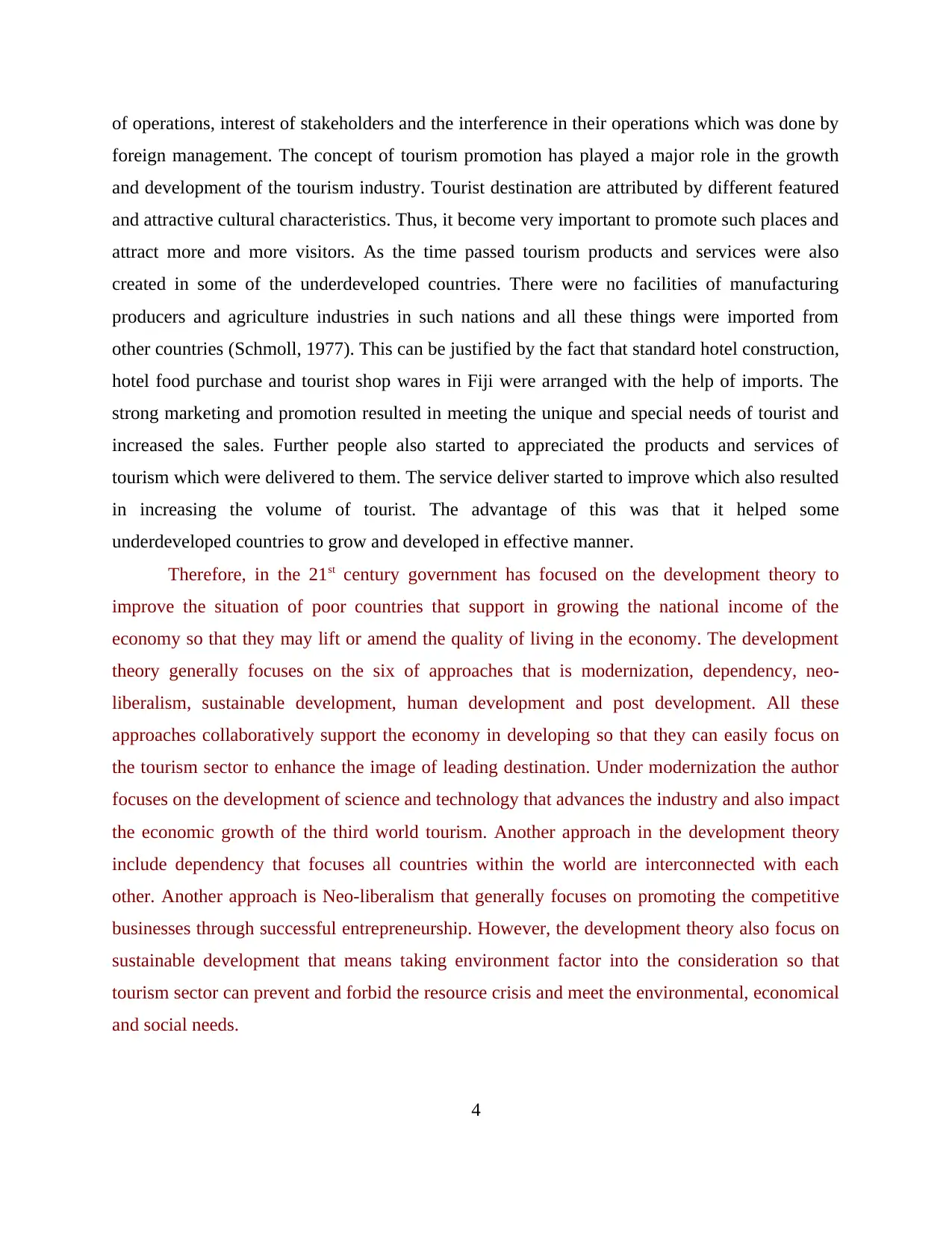
of operations, interest of stakeholders and the interference in their operations which was done by
foreign management. The concept of tourism promotion has played a major role in the growth
and development of the tourism industry. Tourist destination are attributed by different featured
and attractive cultural characteristics. Thus, it become very important to promote such places and
attract more and more visitors. As the time passed tourism products and services were also
created in some of the underdeveloped countries. There were no facilities of manufacturing
producers and agriculture industries in such nations and all these things were imported from
other countries (Schmoll, 1977). This can be justified by the fact that standard hotel construction,
hotel food purchase and tourist shop wares in Fiji were arranged with the help of imports. The
strong marketing and promotion resulted in meeting the unique and special needs of tourist and
increased the sales. Further people also started to appreciated the products and services of
tourism which were delivered to them. The service deliver started to improve which also resulted
in increasing the volume of tourist. The advantage of this was that it helped some
underdeveloped countries to grow and developed in effective manner.
Therefore, in the 21st century government has focused on the development theory to
improve the situation of poor countries that support in growing the national income of the
economy so that they may lift or amend the quality of living in the economy. The development
theory generally focuses on the six of approaches that is modernization, dependency, neo-
liberalism, sustainable development, human development and post development. All these
approaches collaboratively support the economy in developing so that they can easily focus on
the tourism sector to enhance the image of leading destination. Under modernization the author
focuses on the development of science and technology that advances the industry and also impact
the economic growth of the third world tourism. Another approach in the development theory
include dependency that focuses all countries within the world are interconnected with each
other. Another approach is Neo-liberalism that generally focuses on promoting the competitive
businesses through successful entrepreneurship. However, the development theory also focus on
sustainable development that means taking environment factor into the consideration so that
tourism sector can prevent and forbid the resource crisis and meet the environmental, economical
and social needs.
4
foreign management. The concept of tourism promotion has played a major role in the growth
and development of the tourism industry. Tourist destination are attributed by different featured
and attractive cultural characteristics. Thus, it become very important to promote such places and
attract more and more visitors. As the time passed tourism products and services were also
created in some of the underdeveloped countries. There were no facilities of manufacturing
producers and agriculture industries in such nations and all these things were imported from
other countries (Schmoll, 1977). This can be justified by the fact that standard hotel construction,
hotel food purchase and tourist shop wares in Fiji were arranged with the help of imports. The
strong marketing and promotion resulted in meeting the unique and special needs of tourist and
increased the sales. Further people also started to appreciated the products and services of
tourism which were delivered to them. The service deliver started to improve which also resulted
in increasing the volume of tourist. The advantage of this was that it helped some
underdeveloped countries to grow and developed in effective manner.
Therefore, in the 21st century government has focused on the development theory to
improve the situation of poor countries that support in growing the national income of the
economy so that they may lift or amend the quality of living in the economy. The development
theory generally focuses on the six of approaches that is modernization, dependency, neo-
liberalism, sustainable development, human development and post development. All these
approaches collaboratively support the economy in developing so that they can easily focus on
the tourism sector to enhance the image of leading destination. Under modernization the author
focuses on the development of science and technology that advances the industry and also impact
the economic growth of the third world tourism. Another approach in the development theory
include dependency that focuses all countries within the world are interconnected with each
other. Another approach is Neo-liberalism that generally focuses on promoting the competitive
businesses through successful entrepreneurship. However, the development theory also focus on
sustainable development that means taking environment factor into the consideration so that
tourism sector can prevent and forbid the resource crisis and meet the environmental, economical
and social needs.
4
Paraphrase This Document
Need a fresh take? Get an instant paraphrase of this document with our AI Paraphraser
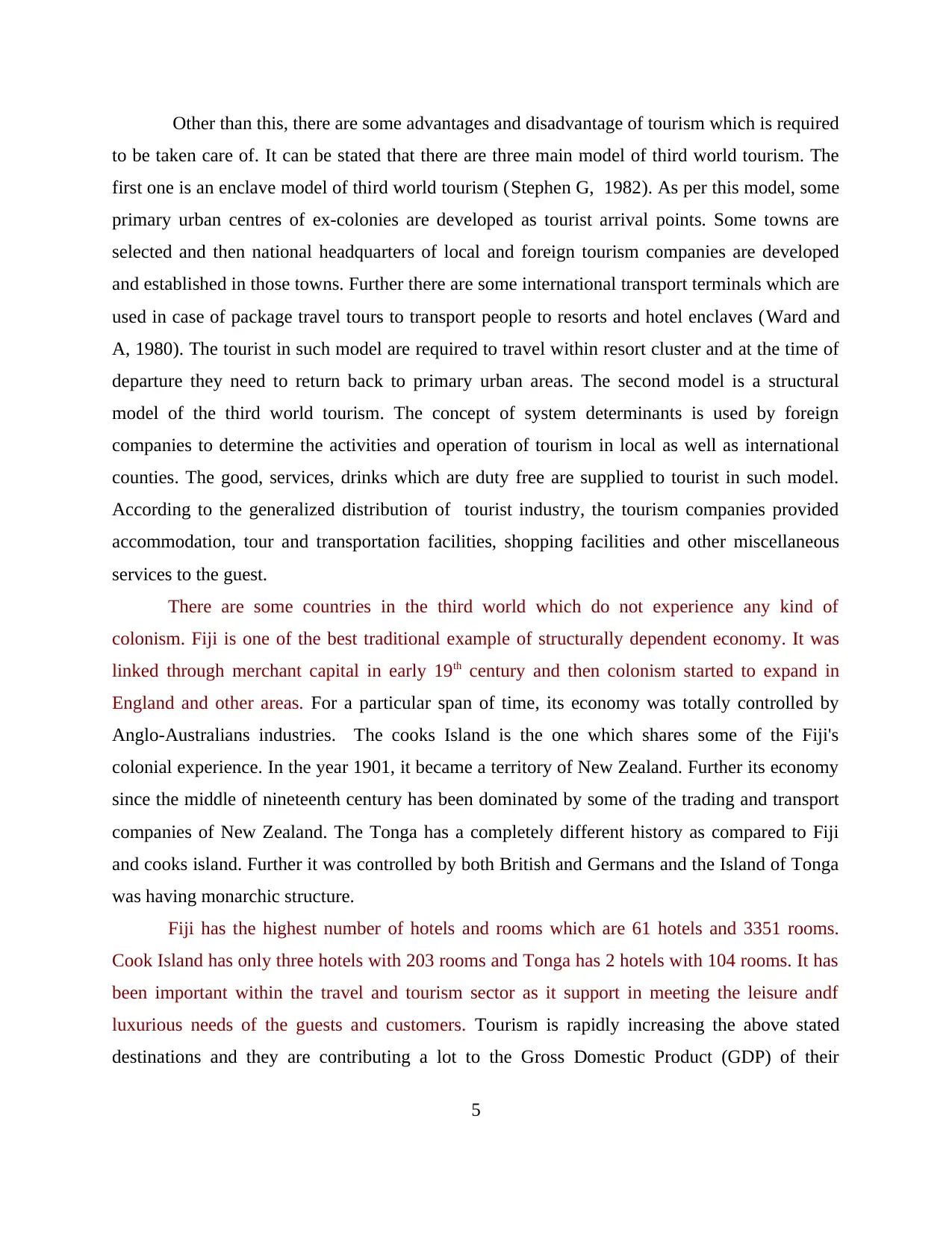
Other than this, there are some advantages and disadvantage of tourism which is required
to be taken care of. It can be stated that there are three main model of third world tourism. The
first one is an enclave model of third world tourism (Stephen G, 1982). As per this model, some
primary urban centres of ex-colonies are developed as tourist arrival points. Some towns are
selected and then national headquarters of local and foreign tourism companies are developed
and established in those towns. Further there are some international transport terminals which are
used in case of package travel tours to transport people to resorts and hotel enclaves (Ward and
A, 1980). The tourist in such model are required to travel within resort cluster and at the time of
departure they need to return back to primary urban areas. The second model is a structural
model of the third world tourism. The concept of system determinants is used by foreign
companies to determine the activities and operation of tourism in local as well as international
counties. The good, services, drinks which are duty free are supplied to tourist in such model.
According to the generalized distribution of tourist industry, the tourism companies provided
accommodation, tour and transportation facilities, shopping facilities and other miscellaneous
services to the guest.
There are some countries in the third world which do not experience any kind of
colonism. Fiji is one of the best traditional example of structurally dependent economy. It was
linked through merchant capital in early 19th century and then colonism started to expand in
England and other areas. For a particular span of time, its economy was totally controlled by
Anglo-Australians industries. The cooks Island is the one which shares some of the Fiji's
colonial experience. In the year 1901, it became a territory of New Zealand. Further its economy
since the middle of nineteenth century has been dominated by some of the trading and transport
companies of New Zealand. The Tonga has a completely different history as compared to Fiji
and cooks island. Further it was controlled by both British and Germans and the Island of Tonga
was having monarchic structure.
Fiji has the highest number of hotels and rooms which are 61 hotels and 3351 rooms.
Cook Island has only three hotels with 203 rooms and Tonga has 2 hotels with 104 rooms. It has
been important within the travel and tourism sector as it support in meeting the leisure andf
luxurious needs of the guests and customers. Tourism is rapidly increasing the above stated
destinations and they are contributing a lot to the Gross Domestic Product (GDP) of their
5
to be taken care of. It can be stated that there are three main model of third world tourism. The
first one is an enclave model of third world tourism (Stephen G, 1982). As per this model, some
primary urban centres of ex-colonies are developed as tourist arrival points. Some towns are
selected and then national headquarters of local and foreign tourism companies are developed
and established in those towns. Further there are some international transport terminals which are
used in case of package travel tours to transport people to resorts and hotel enclaves (Ward and
A, 1980). The tourist in such model are required to travel within resort cluster and at the time of
departure they need to return back to primary urban areas. The second model is a structural
model of the third world tourism. The concept of system determinants is used by foreign
companies to determine the activities and operation of tourism in local as well as international
counties. The good, services, drinks which are duty free are supplied to tourist in such model.
According to the generalized distribution of tourist industry, the tourism companies provided
accommodation, tour and transportation facilities, shopping facilities and other miscellaneous
services to the guest.
There are some countries in the third world which do not experience any kind of
colonism. Fiji is one of the best traditional example of structurally dependent economy. It was
linked through merchant capital in early 19th century and then colonism started to expand in
England and other areas. For a particular span of time, its economy was totally controlled by
Anglo-Australians industries. The cooks Island is the one which shares some of the Fiji's
colonial experience. In the year 1901, it became a territory of New Zealand. Further its economy
since the middle of nineteenth century has been dominated by some of the trading and transport
companies of New Zealand. The Tonga has a completely different history as compared to Fiji
and cooks island. Further it was controlled by both British and Germans and the Island of Tonga
was having monarchic structure.
Fiji has the highest number of hotels and rooms which are 61 hotels and 3351 rooms.
Cook Island has only three hotels with 203 rooms and Tonga has 2 hotels with 104 rooms. It has
been important within the travel and tourism sector as it support in meeting the leisure andf
luxurious needs of the guests and customers. Tourism is rapidly increasing the above stated
destinations and they are contributing a lot to the Gross Domestic Product (GDP) of their
5
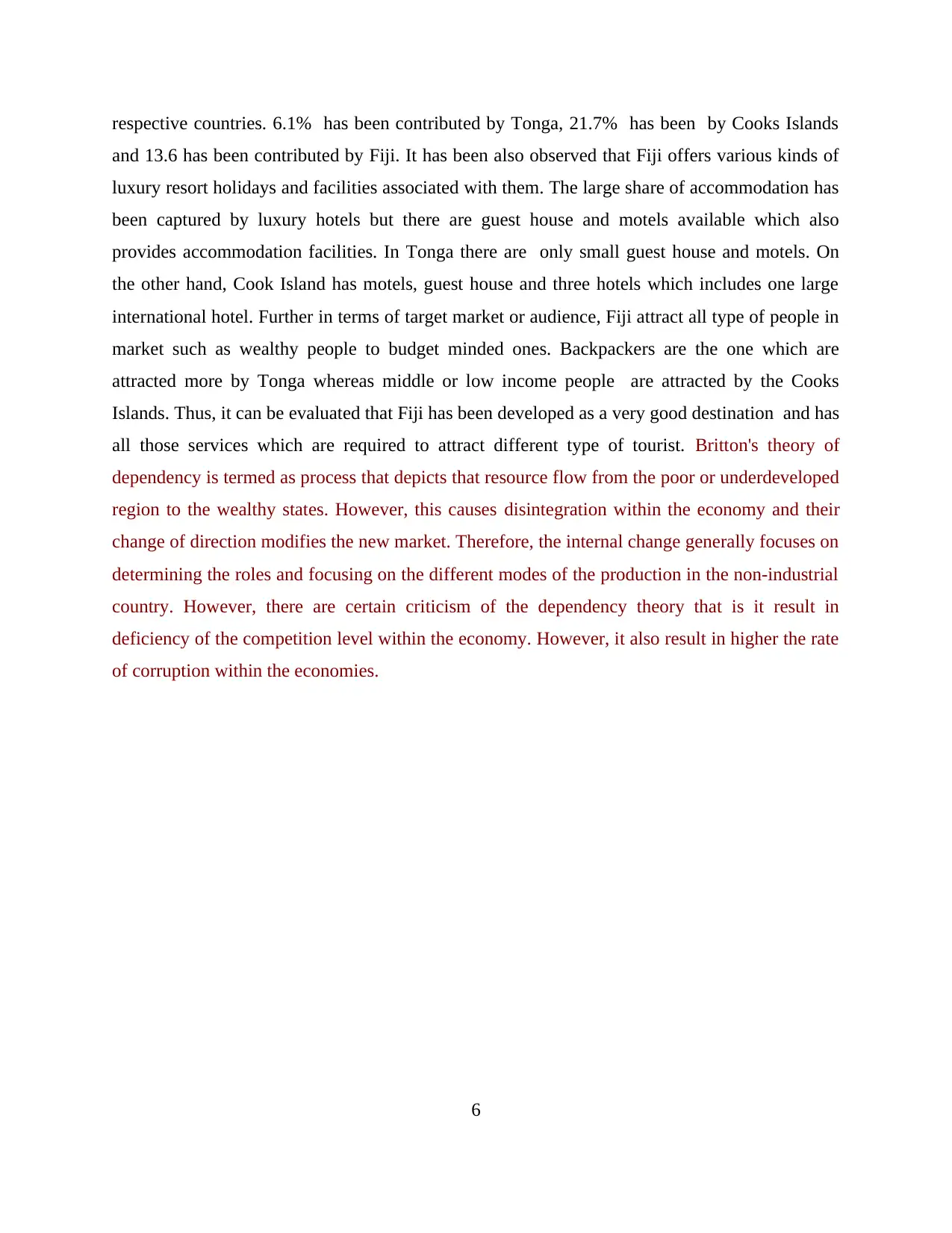
respective countries. 6.1% has been contributed by Tonga, 21.7% has been by Cooks Islands
and 13.6 has been contributed by Fiji. It has been also observed that Fiji offers various kinds of
luxury resort holidays and facilities associated with them. The large share of accommodation has
been captured by luxury hotels but there are guest house and motels available which also
provides accommodation facilities. In Tonga there are only small guest house and motels. On
the other hand, Cook Island has motels, guest house and three hotels which includes one large
international hotel. Further in terms of target market or audience, Fiji attract all type of people in
market such as wealthy people to budget minded ones. Backpackers are the one which are
attracted more by Tonga whereas middle or low income people are attracted by the Cooks
Islands. Thus, it can be evaluated that Fiji has been developed as a very good destination and has
all those services which are required to attract different type of tourist. Britton's theory of
dependency is termed as process that depicts that resource flow from the poor or underdeveloped
region to the wealthy states. However, this causes disintegration within the economy and their
change of direction modifies the new market. Therefore, the internal change generally focuses on
determining the roles and focusing on the different modes of the production in the non-industrial
country. However, there are certain criticism of the dependency theory that is it result in
deficiency of the competition level within the economy. However, it also result in higher the rate
of corruption within the economies.
6
and 13.6 has been contributed by Fiji. It has been also observed that Fiji offers various kinds of
luxury resort holidays and facilities associated with them. The large share of accommodation has
been captured by luxury hotels but there are guest house and motels available which also
provides accommodation facilities. In Tonga there are only small guest house and motels. On
the other hand, Cook Island has motels, guest house and three hotels which includes one large
international hotel. Further in terms of target market or audience, Fiji attract all type of people in
market such as wealthy people to budget minded ones. Backpackers are the one which are
attracted more by Tonga whereas middle or low income people are attracted by the Cooks
Islands. Thus, it can be evaluated that Fiji has been developed as a very good destination and has
all those services which are required to attract different type of tourist. Britton's theory of
dependency is termed as process that depicts that resource flow from the poor or underdeveloped
region to the wealthy states. However, this causes disintegration within the economy and their
change of direction modifies the new market. Therefore, the internal change generally focuses on
determining the roles and focusing on the different modes of the production in the non-industrial
country. However, there are certain criticism of the dependency theory that is it result in
deficiency of the competition level within the economy. However, it also result in higher the rate
of corruption within the economies.
6
⊘ This is a preview!⊘
Do you want full access?
Subscribe today to unlock all pages.

Trusted by 1+ million students worldwide
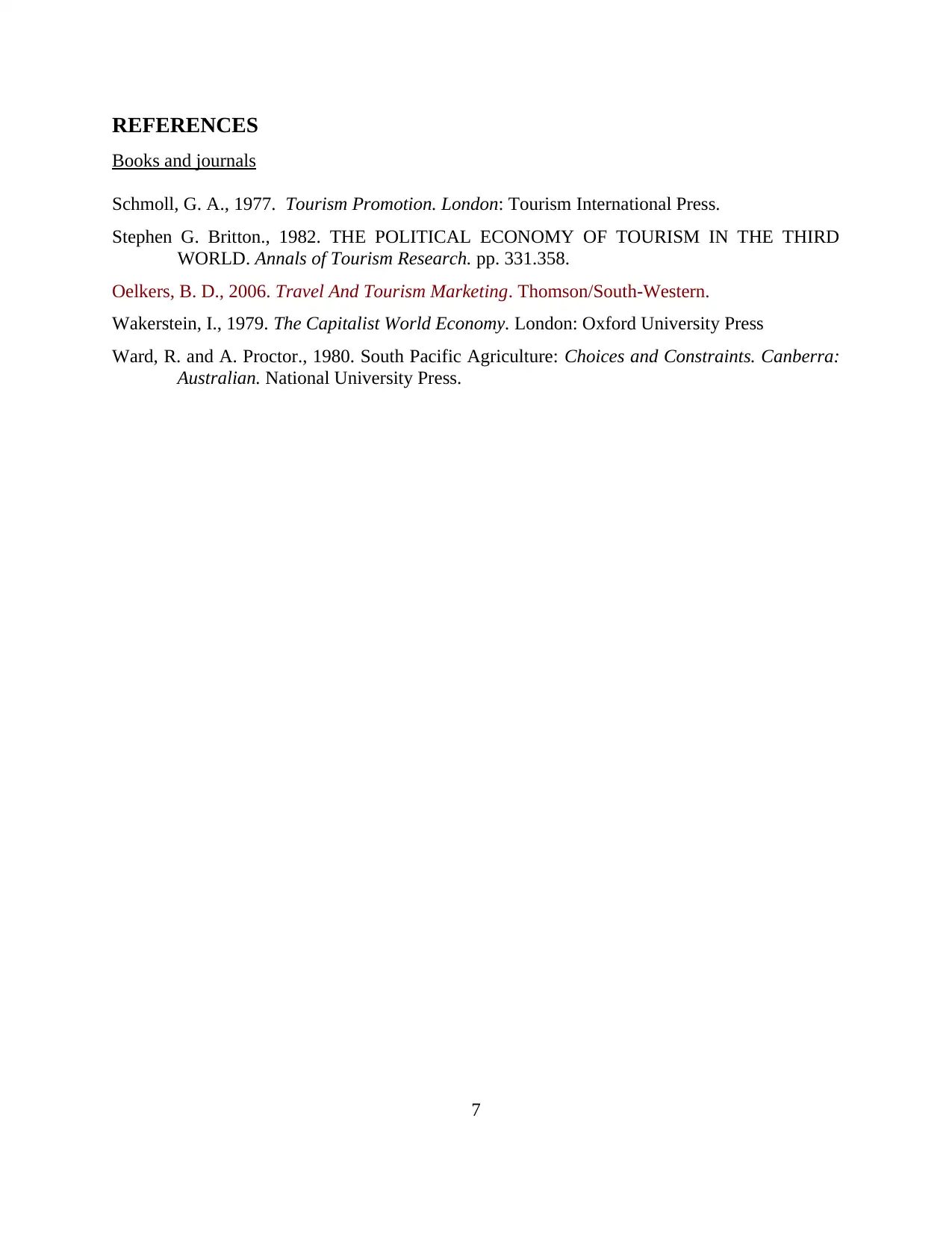
REFERENCES
Books and journals
Schmoll, G. A., 1977. Tourism Promotion. London: Tourism International Press.
Stephen G. Britton., 1982. THE POLITICAL ECONOMY OF TOURISM IN THE THIRD
WORLD. Annals of Tourism Research. pp. 331.358.
Oelkers, B. D., 2006. Travel And Tourism Marketing. Thomson/South-Western.
Wakerstein, I., 1979. The Capitalist World Economy. London: Oxford University Press
Ward, R. and A. Proctor., 1980. South Pacific Agriculture: Choices and Constraints. Canberra:
Australian. National University Press.
7
Books and journals
Schmoll, G. A., 1977. Tourism Promotion. London: Tourism International Press.
Stephen G. Britton., 1982. THE POLITICAL ECONOMY OF TOURISM IN THE THIRD
WORLD. Annals of Tourism Research. pp. 331.358.
Oelkers, B. D., 2006. Travel And Tourism Marketing. Thomson/South-Western.
Wakerstein, I., 1979. The Capitalist World Economy. London: Oxford University Press
Ward, R. and A. Proctor., 1980. South Pacific Agriculture: Choices and Constraints. Canberra:
Australian. National University Press.
7
1 out of 7
Related Documents
Your All-in-One AI-Powered Toolkit for Academic Success.
+13062052269
info@desklib.com
Available 24*7 on WhatsApp / Email
![[object Object]](/_next/static/media/star-bottom.7253800d.svg)
Unlock your academic potential
Copyright © 2020–2026 A2Z Services. All Rights Reserved. Developed and managed by ZUCOL.




